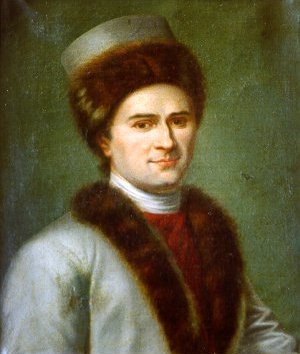
Biography
No other philosopher’s biography is perhaps so well-known as that of Jean-Jacques Rousseau, who made his own life the subject of a number of his writings, including his great autobiographical work, the Confessions. He was born in 1712 in Geneva. His mother died a few days after his birth, and he was raised by his father, a clockmaker, who cared for learning and had Rousseau read classical Greek and Roman literature. His father was forced to leave Geneva while Rousseau was still young. Apprenticed to an engraver, Rousseau eventually left Geneva in 1728, fleeing to Annecy. There at the age of sixteen he met Françoise-Louise de Warens, a woman who would become his benefactor and mistress. Over the next ten years, he earned money as a lackey, engraver, and music teacher. Mme. de Warens sent him during this period to Turin, where he renounced his Calvinism and converted to Roman Catholicism.
Rousseau moved to Paris in 1742 to pursue a career as a musician and composer. In Paris, he soon befriended Diderot, who would go on to fame as an editor of the Encyclopédie. Diderot commissioned Rousseau to write most of the articles for the Encyclopédie on musical subjects, as well as an article on political economy. Rousseau’s time in Paris was interrupted from 1743 to 1744, when he served as Secretary to the French ambassador in Venice.
Rousseau’s rise to fame came with the appearance of his Discourse on the Arts and Sciences, named the winning entry in an essay competition by the Academy of Dijon in 1750. In a famous letter, he describes how, on a journey to Vincennes to visit Diderot, he had an extraordinary vision upon reading the notice of the essay competition: “All at once I felt myself dazzled by a thousand sparkling lights; crowds of vivid ideas thronged into my head with a force and confusion that threw me into unspeakable agitation; I felt my head whirling in a giddiness like that of intoxication.” He claimed that this vision marked a fundamental turning point in his life, and foreshadowed to him the basic principles he would unfold in his First and Second Discourse and his Emile, which he called his three “principal writings.”
In 1752 his short opera Le Devin du Village (“The Village Soothsayer”) was performed at the French court, and his comedy Narcisse was performed at the Théâtre Français. The following year, Rousseau wrote his Letter on French Music (1753), which contrasted Italian opera favorably with that of France. The work sparked a public controversy and even resulted in Rousseau’s being hanged in effigy, as it was viewed as politically seditious.
In 1754, he completed his Discourse on the Origins of Inequality. He returned to Geneva and to the Protestantism of his youth, which allowed him to regain the right to citizenship he had lost with his conversion to Catholicism. In 1755, both the Discourse on the Origins of Inequality and his work Political Economy appeared (the latter in the fifth volume of Diderot and d’Alembert’s Encyclopédie).
In 1756 Rousseau settled in a cottage, the Hermitage, on the estate of Mme. d’Epinay, a friend of many of the philosophes. There he began work on his novel Julie, or the New Heloise. After quarrels with Mme. d’Epinay and with Diderot, Rousseau moved to the country home of the Duke of Luxembourg at Montmorency. In 1758 his Letter to M. d’Alembert on the Theatre was published. It offered a critique of d’Alembert’s article on Geneva in the Encyclopédie. This work made final Rousseau’s public break with most of the philosophes. Julie was published in 1761 and soon becomes one of the best-selling works of the century. Rousseau received thousands of letters from admiring readers, many of whom refused to believe that the characters of the love story were mere literary inventions. This period was to become Rousseau’s most productive. In 1762 both On the Social Contract and Emile were published. Owing especially to each work’s heterodox discussion of Christianity, both were condemned by the authorities and publicly burned in Geneva and Paris. The French government ordered Rousseau’s arrest. As a result, Rousseau fled to Neuchâtel, then governed by Prussia.
At Neuchâtel from 1763 to 1765, Rousseau, among other writing, drafted his Constitutional Project for Corsica. At this time he also began work on his autobiography, the Confessions. In the period following, Rousseau endured increasingly hostile attacks from various leading writers, and eventually decided to leave for England, accepting an offer from the philosopher David Hume to join him there. After two years in England, Rousseau, having quarreled with Hume, whom he (falsely) suspected of drafting an anonymous pamphlet attacking him, returned to France in 1767.
During his final ten years of life, Rousseau completed a number of other works. He composed the Considerations on the Government of Poland and Dialogues: Rousseau Judge of Jean-Jacques in 1772, although both were published only posthumously. He composed his final work, The Reveries of a Solitary Walker, in 1777.
Rousseau died suddenly on July 2, 1778. The publication of the Du Peyrou-Moultou edition of his collected works appeared in 1782, and made available to the public for the first time many of his autobiographical writings and later political works, as well as letters, fragments, and other shorter works. In 1794, Rousseau’s ashes were moved to the Panthéon.
For more detailed biographical information, see:
Robert Wokler, Rousseau: A Very Short Introduction, Oxford: 2001.
For an excellent full length biography of Rousseau (in three volumes) see:
Maurice Cranston, Jean-Jacques: The Early Life and Work of Jean-Jacques Rousseau, Chicago: 1991.
Cranston, The Noble Savage: Jean-Jacques Rousseau, 1754-1762, Chicago: 1999.
Cranston, The Solitary Self: Jean-Jacques Rousseau in Exile and Adversity, Chicago: 1999.